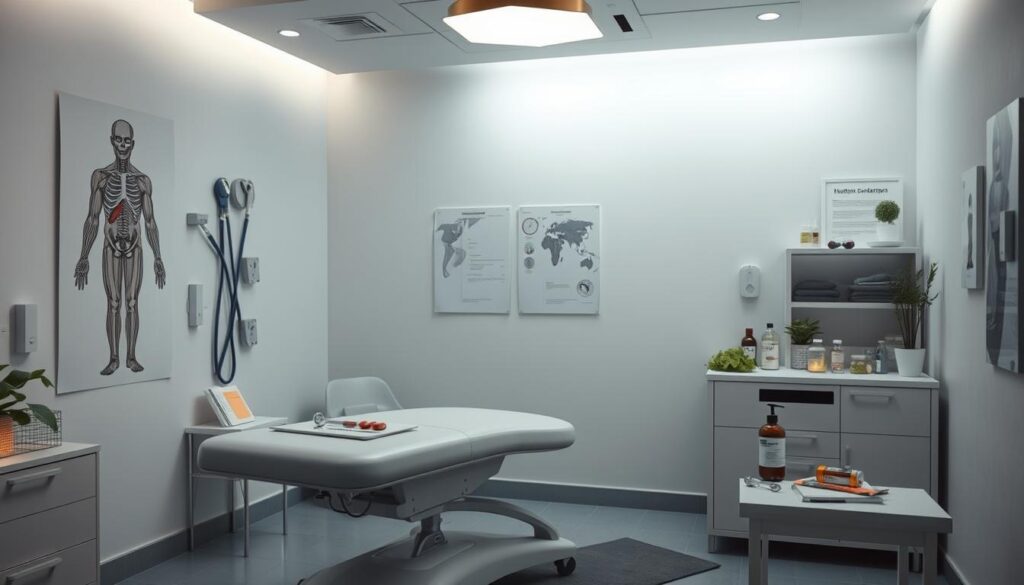Sexual health problems affect millions of men in the United States. Erectile dysfunction (ED) impacts about 30 million men. It’s key to understand medical solutions for men to keep them healthy and happy.
Our team offers complete sexual health options for men. We look at both physical and mental sides of male sexual health. Talking to men’s health experts can find the cause of sexual problems early.
Today, there are many ways to treat erectile dysfunction. Options include oral medications like testosterone replacement therapy and new surgeries. Men now have better ways to improve their sex life.
ED affects about 40 percent of men by age 40 and 70 percent by age 70. These numbers show why it’s important to take care of your health and seek help early.
We know that sexual health is linked to overall health and mind. Our goal is to help men find the right solutions. This way, they can feel confident and live better lives.
Understanding Sexual Health Diagnosis and Screening
For men, knowing about sexual health screening is key to staying healthy. It’s important to check for health issues early on. This way, problems can be caught and treated before they get worse.
Physical Examination and Initial Assessment
A detailed medical check-up is the first step in sexual health assessment. We focus on getting a full patient history and doing a specific physical exam. This initial check includes:
- Comprehensive medical history review
- Evaluation of current symptoms
- Assessment of risk factors
- Physical examination for potential indicators
Laboratory Testing and Diagnostics
Advanced testing is a big part of sexual health care. Checking testosterone levels and blood work gives us important information about health risks.
| Test Type | Purpose | Recommended Frequency |
|---|---|---|
| HIV Screening | Detect viral infection | At least once for adults 15-65 |
| STI Panel | Identify potential infections | Annually or with new partners |
| Hormone Panel | Assess hormonal balance | Every 2-3 years after 40 |
Screening Recommendations by Age and Risk Factors
Talking to men’s health experts helps set up the right screening plan. Each age group and risk level needs its own approach to sexual health care.
- Age 18-35: Basic annual screenings
- Age 35-50: Comprehensive metabolic and hormonal tests
- Age 50+: Detailed cardiovascular and hormonal evaluations
Early detection and proactive screening are key to maintaining optimal sexual health and overall wellness.
Medical Solutions for Men: Treatment Options and Approaches

Sexual health issues affect millions of men, with erectile dysfunction (ED) becoming more common as men get older. About 50% of 50-year-olds and 60% of 60-year-olds face erectile problems. This makes finding medical solutions for men very important.
Dealing with sexual health needs a wide range of treatments. Doctors often suggest a mix of treatments based on each person’s needs. Changing your lifestyle is also key in improving sexual health.
- Oral Medications: Sildenafil, Tadalafil, and other ED treatments can help by improving blood flow
- Hormone Therapy: Testosterone replacement can help men with low hormone levels
- Alternative Treatments: Penis pumps and surgery for those who don’t get better with other treatments
When checking for sexual health issues, doctors usually do:
- Physical check-ups
- Looking at your medical history
- Blood tests to find underlying problems
- Special imaging studies
For younger men facing sexual health issues, there are behavioral and medical solutions. Our method focuses on a complete approach. It covers both physical and mental sides of sexual health.
Conclusion
Sexual health is key to a man’s overall wellness, yet many men shy away from seeking help. In the US, men are less likely to visit doctors, leading to gaps in understanding and addressing their health concerns. Our research shows the need for proactive medical care and comprehensive health strategies designed for men’s specific needs.
Medical solutions for men need a holistic approach, moving beyond traditional treatments. Men face barriers like social stigma and limited health knowledge. Encouraging open talks and professional medical consultations can help men overcome these obstacles and enhance their quality of life.
It’s vital for men to consult with health professionals about their sexual health issues. The data shows men are less likely to seek medical help than women, leading to undiagnosed conditions. Breaking down these barriers requires education, support, and personalized medical advice that covers both physical and mental aspects of sexual health.
Finally, taking charge of sexual health is a sign of self-care and empowerment. Men should see seeking help as a sign of strength, not weakness. By embracing comprehensive medical solutions and talking openly with healthcare providers, men can achieve better health and personal well-being.










